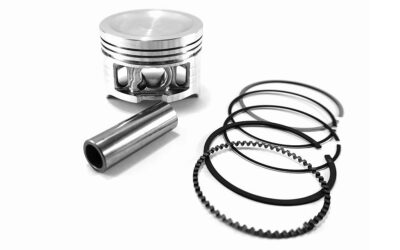Table of Contents
1. Overheating
When it comes to the longevity of your engine, overheating can be a formidable adversary. Engine overheating occurs when the temperature rises beyond the optimal operating range, often due to issues with the cooling system or inadequate lubrication. This can lead to a cascade of problems, including warping of engine components, cylinder head damage, piston damage, and even catastrophic failure if left unaddressed.
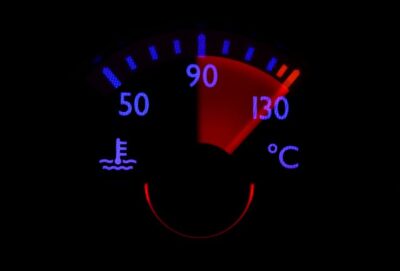
Over Heated Engine
Causes of Overheating:
- Coolant Leaks: Coolant leaks can compromise the cooling system’s ability to regulate engine temperature, leading to overheating.
- Faulty Thermostat: A malfunctioning thermostat can prevent the proper circulation of coolant, resulting in temperature spikes.
- Blocked Radiator: Debris or sediment buildup in the radiator can impede the flow of coolant, causing the engine to overheat.
- Low Coolant Levels: Insufficient coolant levels can lead to inadequate heat dissipation, contributing to overheating.
Consequences of Overheating:
- Warping: Overheating can cause components like the cylinder head and engine block to warp, compromising their structural integrity.
- Piston Damage: Excessive heat can cause pistons to expand beyond their tolerances, leading to scoring and potential failure.
- Cylinder Head Damage: The cylinder head can warp or develop cracks under extreme heat conditions, necessitating costly repairs.
- Coolant Contamination: Overheating can result in coolant contamination due to the breakdown of seals and gaskets, further exacerbating engine issues.
Prevention and Maintenance:
- Regular Cooling System Inspections: Periodic checks of the cooling system for leaks, blockages, and coolant levels can help prevent overheating.
- Proper Lubrication: Ensuring the engine is adequately lubricated with the correct oil grade helps reduce friction and heat buildup.
- Timely Repairs: Addressing minor issues promptly can prevent them from escalating into major overheating problems.
By addressing overheating issues proactively and adhering to a stringent maintenance schedule, you can extend the lifespan of your engine and minimize the need for costly rebuilds.
2. Worn Piston Rings
Piston rings play a crucial role in maintaining proper compression and oil control within the engine cylinders. Over time, these rings can wear out due to continuous friction and heat cycles, leading to a range of issues that may necessitate an engine rebuild.
Understanding Piston Ring Wear:
- Reduced Compression: Worn piston rings result in decreased compression, leading to diminished engine performance and power.
- Increased Oil Consumption: As piston rings wear, they become less effective at sealing the combustion chamber, allowing oil to bypass and burn during the combustion process.
- Loss of Engine Efficiency: Worn piston rings contribute to decreased fuel efficiency and increased emissions due to incomplete combustion and oil consumption.
Causes of Piston Ring Wear:
- Inadequate Lubrication: Improper lubrication or using the wrong type of oil can accelerate piston ring wear and lead to premature failure.
- High Mileage: Piston rings naturally wear out over time, especially in engines with high mileage or frequent heavy use.
- Poor Maintenance: Neglecting regular oil changes and engine inspections can accelerate piston ring wear and exacerbate other engine issues.
Signs of Piston Ring Wear:
- Increased Oil Consumption: Noticeable increase in oil consumption between oil changes.
- Blue Smoke from Exhaust: Burning oil produces blue smoke from the exhaust due to oil passing through worn piston rings.
- Loss of Power: Reduced engine performance and power output due to decreased compression.
Prevention and Maintenance:
- Regular Oil Changes: Changing the oil and filter at recommended intervals helps maintain proper lubrication and reduces wear on piston rings.
- Engine Inspections: Periodic engine inspections can help detect early signs of piston ring wear and other potential issues.
- Use of High-Quality Oil: Using high-quality engine oil recommended by the manufacturer can help prolong the life of piston rings and other engine components.
Addressing piston ring wear early through regular maintenance and timely repairs can prevent further engine damage and extend the lifespan of your engine.
3. Blown Head Gasket
A blown head gasket is a critical engine issue that requires immediate attention to prevent further damage and ensure the longevity of your engine. The head gasket serves as a seal between the engine block and the cylinder head, maintaining compression and preventing coolant and oil from mixing. When the head gasket fails, it can lead to a host of problems that may necessitate a complete engine rebuild.
Understanding Head Gasket Failure:
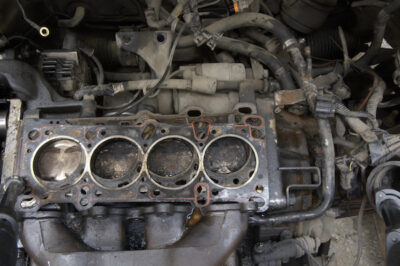
Head gasket failure
- Coolant Leakage: A blown head gasket can allow coolant to leak into the combustion chamber or oil passages, resulting in coolant contamination and potential engine overheating.
- Compression Loss: The head gasket maintains compression within the cylinders. When it fails, compression can leak between cylinders or into the cooling system, leading to decreased engine performance.
- Oil Contamination: Oil and coolant may mix due to a blown head gasket, resulting in contaminated oil and potential damage to engine bearings and components.
Causes of Head Gasket Failure:
- Overheating: Excessive engine temperatures can cause the head gasket to fail due to thermal stress and expansion.
- Coolant Contamination: Contaminated coolant can lead to corrosion of the head gasket material, compromising its integrity.
- Old Age and Wear: Over time, the head gasket may degrade and lose its ability to seal properly, especially in engines with high mileage or inadequate maintenance.
Signs of a Blown Head Gasket:
- White Smoke from Exhaust: Coolant burning in the combustion chamber produces white smoke from the exhaust.
- Engine Misfires: Compression loss due to a blown head gasket can result in engine misfires and rough idling.
- Milky Oil: Coolant mixing with engine oil can cause the oil to take on a milky appearance.
Prevention and Maintenance:
- Regular Cooling System Maintenance: Proper maintenance of the cooling system, including coolant flushes and inspections, can help prevent overheating and head gasket failure.
- Prompt Repairs: Addressing overheating issues and coolant leaks promptly can prevent damage to the head gasket and other engine components.
- Quality Gasket Replacement: When replacing the head gasket, use high-quality gaskets and follow manufacturer recommendations for installation procedures.
By being vigilant for signs of head gasket failure and addressing issues promptly, you can minimize the risk of extensive engine damage and the need for a costly rebuild.
4. Timing Belt Failure
The timing belt is a critical component of the engine’s timing system, synchronizing the rotation of the crankshaft and camshaft to ensure proper engine operation. When the timing belt fails, it can result in significant engine damage and the need for extensive repairs or a complete rebuild.
Understanding Timing Belt Failure:

Timing Belt
- Valve and Piston Interference: In interference engines, a failed timing belt can cause the pistons to collide with the valves, leading to bent valves, damaged pistons, and potential cylinder head damage.
- Engine Synchronization Issues: The timing belt ensures precise timing between the crankshaft and camshaft. If it fails, the engine may experience timing issues, resulting in poor performance and potential engine stalling.
- Catastrophic Engine Damage: Timing belt failure can result in catastrophic engine damage, including bent valves, damaged pistons, and cylinder head damage, necessitating extensive repairs or a complete engine rebuild.
Causes of Timing Belt Failure:
- Age and Wear: Timing belts degrade over time and should be replaced according to the manufacturer’s recommended maintenance schedule.
- High Mileage: Timing belts in engines with high mileage are more prone to failure due to increased wear and stress.
- Lack of Maintenance: Neglecting timing belt replacement as part of routine maintenance increases the risk of failure and potential engine damage.
Signs of Timing Belt Failure:
- Engine Misfires: Timing belt issues can cause misfires and irregular engine operation.
- Visible Wear or Damage: Visual inspection of the timing belt may reveal signs of wear, cracking, or fraying.
- Engine Stalling: Timing belt failure can result in engine stalling and an inability to restart.
Prevention and Maintenance:
- Regular Timing Belt Replacement: Follow the manufacturer’s recommended timing belt replacement interval to prevent failure and potential engine damage.
- Inspection of Timing Components: During timing belt replacement, inspect associated components such as tensioners and pulleys for wear and replace them as needed.
- Proactive Repairs: Address any signs of timing belt wear or damage promptly to prevent catastrophic engine failure.
By staying proactive with timing belt maintenance and addressing issues promptly, you can minimize the risk of timing belt failure and prolong the life of your engine.
5. Oil Leaks
Persistent oil leaks are more than just a messy nuisance; they can lead to serious engine problems if left unattended. Adequate lubrication is crucial for an engine’s health, and oil leaks can result in oil starvation, increased friction, and potential damage to critical components.
Common Causes of Oil Leaks:

Oil Leak
- Worn Gaskets and Seals: Over time, gaskets and seals can degrade, leading to oil leaks at various points in the engine.
- Loose or Damaged Oil Pans: The oil pan can be damaged by road debris or corrosion, causing leaks.
- Faulty Valve Cover Gaskets: Gaskets that seal the valve covers can wear out, allowing oil to leak onto the engine.
- Degraded Rear Main Seal: The rear main seal prevents oil from leaking out of the back of the engine. When it fails, oil leaks can occur.
Consequences of Oil Leaks:
- Oil Starvation: Continuous oil leaks can lead to low oil levels, resulting in inadequate lubrication and increased friction.
- Increased Wear on Engine Components: Components such as bearings and pistons can experience accelerated wear due to insufficient lubrication.
- Environmental Impact: Oil leaks contribute to environmental pollution and may lead to fines in some regions.
Signs of Oil Leaks:
- Visible Puddles or Stains Under the Vehicle: Obvious signs of oil leakage on the ground where the vehicle is parked.
- Burning Smell: Oil leaking onto hot engine components can produce a noticeable burning smell.
- Low Oil Levels: Regularly checking and topping up oil levels can reveal a persistent oil leak.
Prevention and Maintenance:
- Regular Inspections: Periodic visual inspections of the engine for signs of oil leaks can help detect issues early.
- Prompt Repairs: Addressing oil leaks promptly by replacing worn gaskets, seals, or damaged components can prevent further damage.
- Quality Oil and Filters: Using high-quality oil and filters can contribute to the overall health of the engine and reduce the risk of leaks.
By addressing oil leaks in a timely manner, you can maintain proper lubrication, reduce wear on engine components, and extend the life of your engine.
6. Poor Maintenance
Neglecting regular maintenance is a common precursor to various engine problems, leading to accelerated wear and potential failure of critical components. Proper maintenance is essential for keeping your engine running smoothly and avoiding costly repairs or rebuilds.
Effects of Poor Maintenance:
- Accelerated Wear and Tear: Neglected engines are more prone to wear and tear, leading to decreased performance and potential damage to vital components.
- Increased Risk of Breakdowns: Components that are not properly maintained are more likely to fail unexpectedly, leading to vehicle breakdowns and inconvenience.
- Reduced Engine Lifespan: Lack of maintenance can significantly shorten the lifespan of an engine, requiring premature repairs or replacements.
Common Maintenance Tasks:
- Regular Oil Changes: Changing the engine oil and oil filter at recommended intervals helps maintain proper lubrication and removes contaminants.
- Air Filter Replacement: A clean air filter promotes efficient airflow to the engine, enhancing performance and fuel efficiency.
- Spark Plug Inspection and Replacement: Spark plugs degrade over time and can affect engine performance if not replaced periodically.
- Cooling System Maintenance: Flushing and refilling the coolant at recommended intervals prevents overheating and corrosion in the cooling system.
- Timing Belt Replacement: Timing belts should be replaced according to the manufacturer’s recommended schedule to prevent failure and potential engine damage.
Consequences of Neglecting Maintenance:
- Engine Misfires: Worn spark plugs or dirty air filters can lead to engine misfires and reduced fuel efficiency.
- Overheating: Neglected cooling systems can lead to overheating and potential damage to engine components.
- Increased Fuel Consumption: Dirty filters and poor engine performance can result in increased fuel consumption and higher operating costs.
Importance of Regular Maintenance:
- Preventive Maintenance: Regular maintenance helps identify potential issues early, preventing costly repairs down the line.
- Improved Performance: Well-maintained engines perform more efficiently, delivering better fuel economy and smoother operation.
- Long-Term Cost Savings: Investing in routine maintenance can save money in the long run by avoiding major repairs or premature engine replacements.
By prioritizing regular maintenance tasks and adhering to recommended service intervals, you can prolong the life of your engine and minimize the risk of unexpected breakdowns.
7. Excessive Wear and Tear
High mileage, harsh driving conditions, and inadequate maintenance can contribute to excessive wear and tear on engine components, compromising performance and reliability. Understanding the factors that contribute to wear and tear can help prevent premature engine failure and the need for costly rebuilds.
Factors Contributing to Excessive Wear and Tear:
- High Mileage: Engines with high mileage are more susceptible to wear and tear due to prolonged use and exposure to heat and friction.
- Harsh Driving Conditions: Driving in extreme temperatures, stop-and-go traffic, and rough terrain can accelerate wear on engine components.
- Neglected Maintenance: Failure to perform regular maintenance tasks, such as oil changes and filter replacements, can lead to increased wear and potential damage to vital engine parts.
Common Signs of Excessive Wear and Tear:
- Engine Noise: Increased engine noise, such as knocking or rattling, may indicate worn bearings or other internal components.
- Decreased Performance: Reduced acceleration, power, and fuel efficiency can be signs of worn-out engine components.
- Oil Consumption: Excessive oil consumption between oil changes may indicate worn piston rings or valve seals.
- Visible Wear: Visual inspection of engine components may reveal signs of wear, corrosion, or damage.
Consequences of Excessive Wear and Tear:
- Decreased Engine Performance: Worn-out components can lead to reduced power, efficiency, and overall performance.
- Increased Risk of Breakdowns: Components nearing the end of their lifespan are more prone to failure, resulting in unexpected breakdowns.
- Higher Repair Costs: Neglected wear and tear can lead to more extensive damage over time, resulting in costly repairs or engine rebuilds.
Prevention and Maintenance:
- Regular Inspections: Periodic inspections of engine components can help detect signs of wear and address issues before they escalate.
- Timely Repairs: Addressing minor issues promptly can prevent them from worsening and causing further damage to the engine.
- Quality Replacement Parts: Using high-quality replacement parts and fluids can help prolong the life of engine components and reduce wear.
By practicing proactive maintenance and addressing signs of wear and tear early, you can extend the lifespan of your engine and ensure reliable performance over the long term.
8. Improper Lubrication
Proper lubrication is vital for ensuring smooth operation and longevity of engine components. However, using the wrong type of oil or neglecting oil changes can lead to inadequate lubrication, increased friction, and potential damage to critical engine parts.
Understanding the Importance of Lubrication:
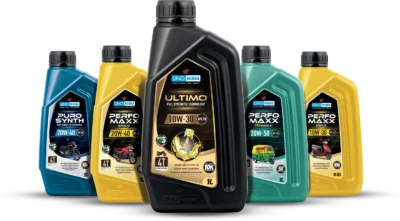
Engine Oils
- Reduction of Friction: Lubricating oil forms a protective barrier between moving engine parts, reducing friction and wear.
- Heat Dissipation: Oil helps dissipate heat generated by engine operation, preventing components from overheating and seizing.
- Corrosion Protection: Lubricating oil inhibits corrosion and rust formation on metal surfaces, extending the life of engine components.
Common Causes of Improper Lubrication:
- Using the Wrong Oil: Using oil with the incorrect viscosity or additives for the engine type can lead to inadequate lubrication and increased wear.
- Neglecting Oil Changes: Over time, oil becomes contaminated with dirt, debris, and combustion by-products, reducing its effectiveness as a lubricant.
- Ignoring Oil Leaks: Oil leaks can result in low oil levels and inadequate lubrication of engine components.
Signs of Improper Lubrication:
- Engine Noise: Increased friction due to inadequate lubrication can result in abnormal engine noises, such as knocking or tapping.
- Increased Oil Consumption: Engine components may consume more oil than usual due to increased friction and wear.
- Overheating: Inadequate lubrication can lead to increased heat buildup in the engine, resulting in overheating and potential damage.
Prevention and Maintenance:
- Regular Oil Changes: Follow the manufacturer’s recommended oil change intervals and use high-quality oil that meets the engine specifications.
- Address Oil Leaks Promptly: Identify and repair any oil leaks to prevent loss of lubrication and potential engine damage.
- Monitor Oil Levels: Check oil levels regularly and top up as needed to ensure proper lubrication of engine components.
By prioritizing proper lubrication and adhering to a regular maintenance schedule, you can protect your engine from premature wear and extend its lifespan.
9. Fuel Contamination
Contaminated fuel can have detrimental effects on engine performance and reliability, leading to issues such as poor combustion, engine misfires, and potential damage to fuel system components. Understanding the sources and consequences of fuel contamination is crucial for maintaining optimal engine function.
Sources of Fuel Contamination:
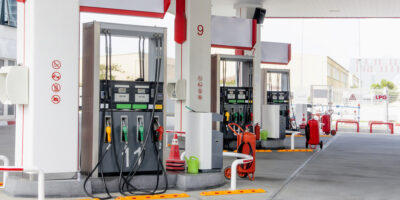
Fuel Station
- Water Intrusion: Water can enter the fuel system through condensation in fuel tanks or contaminated fuel sources, leading to fuel system corrosion and engine damage.
- Particulate Matter: Dust, debris, and other particulate matter can enter the fuel system during storage, transportation, or refueling, causing fuel filter clogging and injector damage.
- Microbial Growth: Microbial organisms such as bacteria and fungi can thrive in fuel tanks and biofuel blends, leading to fuel degradation and filter plugging.
Consequences of Fuel Contamination:
- Poor Combustion: Contaminated fuel can result in incomplete combustion, leading to reduced engine power, rough idling, and increased emissions.
- Engine Misfires: Fuel system contamination can cause engine misfires, hesitation, and poor throttle response, affecting overall drivability.
- Fuel System Damage: Particulate matter and water can cause corrosion, erosion, and wear on fuel system components such as injectors, pumps, and filters.
Signs of Fuel Contamination:
- Rough Running Engine: Engine hesitation, stalling, or rough idling may indicate fuel system issues caused by contamination.
- Decreased Fuel Efficiency: Contaminated fuel can lead to decreased fuel efficiency and increased fuel consumption over time.
- Fuel System Component Failure: Premature failure of fuel system components, such as injectors and pumps, may indicate contamination-related damage.
Prevention and Mitigation Strategies:
- Use of Quality Fuel: Purchase fuel from reputable sources to minimize the risk of contamination.
- Regular Fuel System Inspections: Periodic inspection of fuel system components and filters can help detect and address contamination issues early.
- Fuel Tank Maintenance: Keep fuel tanks clean and free from water accumulation to prevent microbial growth and corrosion.
By implementing preventive measures and addressing fuel contamination issues promptly, you can maintain optimal engine performance and prolong the life of your fuel system.
10. Pre-Ignition or Detonation
Pre-ignition and detonation are abnormal combustion phenomena that can have serious consequences for engine performance and durability. Understanding the causes and effects of pre-ignition and detonation is essential for preventing engine damage and ensuring reliable operation.
Understanding Pre-Ignition and Detonation:
- Pre-Ignition: Pre-ignition occurs when the air-fuel mixture ignites before the spark plug fires, often due to hot spots in the combustion chamber or high compression ratios.
- Detonation: Detonation, also known as engine knocking, occurs when pockets of unburned fuel ignite spontaneously, producing a rapid and uncontrolled rise in cylinder pressure.
Causes of Pre-Ignition and Detonation:
- High Engine Temperatures: Elevated engine temperatures can promote pre-ignition by causing hot spots in the combustion chamber.
- Low-Octane Fuel: Using fuel with insufficient octane rating can lead to detonation, especially in high-performance engines.
- Carbon Deposits: Carbon deposits on piston crowns, cylinder walls, and spark plugs can create hot spots and increase the likelihood of pre-ignition.
- Excessive Cylinder Pressure: Overly aggressive tuning or turbocharging can increase cylinder pressure, promoting detonation.
Effects of Pre-Ignition and Detonation:
- Engine Damage: Pre-ignition and detonation can cause piston crown erosion, piston ring damage, and even catastrophic engine failure.
- Power Loss: Abnormal combustion events can result in reduced engine power, rough idling, and poor throttle response.
- Increased Emissions: Incomplete combustion associated with pre-ignition and detonation can lead to increased emissions of harmful pollutants.
Signs of Pre-Ignition and Detonation:
- Engine Knocking: Audible knocking or pinging noises during acceleration or under load indicate detonation.
- Loss of Power: Reduced engine performance and responsiveness may be indicative of abnormal combustion events.
- Spark Plug Damage: Inspecting spark plugs for signs of erosion or damage can reveal pre-ignition or detonation issues.
Prevention and Mitigation Strategies:
- Use of High-Octane Fuel: Using fuel with a higher octane rating can help prevent pre-ignition and detonation in high-performance engines.
- Engine Calibration: Proper engine tuning and calibration can optimize air-fuel mixture and ignition timing to minimize the risk of abnormal combustion.
- Detonation Sensors: Installing detonation sensors allows for real-time detection and adjustment of engine parameters to prevent detonation.
By understanding the causes and effects of pre-ignition and detonation and implementing appropriate preventive measures, you can protect your engine from damage and ensure reliable performance.
 Ensuring the proper maintenance and care of your engine is paramount to its longevity and performance. From issues such as overheating and worn piston rings to fuel contamination and pre-ignition, understanding the causes and signs of engine problems is crucial for preventing costly damage and repairs.
Ensuring the proper maintenance and care of your engine is paramount to its longevity and performance. From issues such as overheating and worn piston rings to fuel contamination and pre-ignition, understanding the causes and signs of engine problems is crucial for preventing costly damage and repairs.
At Baldyne Engineering Services, we specialize in providing comprehensive solutions for a wide range of engine issues. Our team of experts is equipped with the knowledge and expertise to diagnose and address any issues your engine may be experiencing promptly and effectively.
If you encounter any of the issues outlined above or have concerns about your engine’s performance, don’t hesitate to contact us immediately. Our dedicated team will work closely with you to assess the situation and provide tailored solutions to prevent any further damage. Your engine’s health and reliability are our top priorities, and we are here to ensure that your engine continues to operate at its best for years to come.

